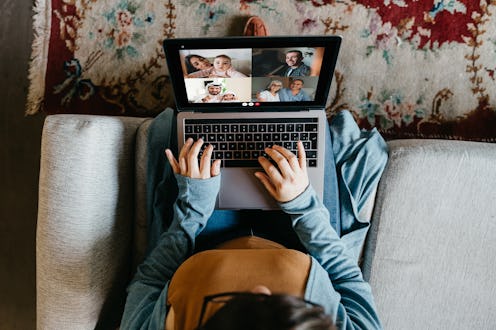Life
FaceTiming Is Better For Your Brain Than A Phone Call, According To Experts

Working from home can be rough: No contact with coworkers, no trips to the break room, just you, yourself, and your laptop. Zoom calls or other kinds of video conferencing will be forever remembered as hallmarks of this era. But FaceTiming doesn't just offer convenience and a little face-to-face interaction: your brain reacts to videochatting similarly to an IRL encounter.
Isolation can physically change the brain over time, according to research, making us more anxious, suspicious, and angry. A video call can defuse those emotions and help you feel more connected to those around you.
"Working from home is not easy and requires quite a bit of discipline, so you should make time for socializing," Dr. Sarita Robinson PhD, CPsychol, SFHEA, ICPEM, an expert on the neuropsychology of survival and principal lecturer in psychology at the University of Central Lancashire, tells Bustle.
Seeing the people you know on your screen, whether they're coworkers, friends, or family, will activate your brain in the same way as seeing them in the flesh. Humans love seeing other faces; our brains develop the ability to recognize and respond to faces at as young as five months old. A study published in Neurology in 2019 found that there are particular parts of the visual cortex devoted to scanning and interpreting the faces of others, including their emotions. Social interaction of all kinds is crucial to brain health, but visual contact with others appears to be particularly good for us.
Studies show that video calls, as opposed to phone meetings, can also be helpful for your emotional health. A 2018 study published in The American Journal of Geriatric Psychiatry looked at nearly 1,500 older adults in the U.S., who are more likely to be socially isolated, and found that using video chats to stay connected can reduce depressive symptoms by nearly 50% compared to audio and email connections.
Research published in Cyberpsychology: Journal Of Psychosocial Research in 2013 looked at 58 pairs of female friends aged 18 to 21. The researchers also found that while in-person conversations provided the biggest feelings of bonding, video chats were close behind. Audio conversations provided weaker feelings of bonding, with instant messaging last — though the more the women used emojis and typed laughter in the messages, the more connected they felt.
Video chats can also reduce anxiety, particularly at fraught times. "We draw on social support from our colleagues on a daily basis and it can be very difficult if we do not receive that social support," Dr. Robinson says. "When you are on your own anxieties and worries can seem much bigger than when we can share them with a friend. Having a chat, a laugh or just sharing worries with people can help us feel less anxious."
However, if your brain is responding to isolation by producing high levels of adrenaline, Zoom calls may make it worse, particularly if you experience social anxiety. Speaking to people over a video chat is just as stressful as speaking in person for some, particularly if formerly safe spaces like your home are now work environments. If this is the case, therapist Heidi McBain LMFT tells Bustle, try to figure out where your anxiety is coming from: is it about having to talk in front of a lot of people, being observed in your own home, or something else? "Once you know where your social anxiety is stemming from, try to figure out ways that you can still do your job while also taking care of your mental health," she says.
For some people, she notes, social anxiety may mean it's better if you keep video off during some calls, limit the number of people per meeting, or do phone calls instead. She also recommends talking to your boss about how to manage your feelings, and prioritizing anxiety-calming self-care procedures like guided meditation, journaling, or talking to a therapist.
Even if you don't spend a lot of time with colleagues at work, getting on that Zoom call is a good idea when you're working from home, Dr. Robinson says. Get into a comfy chair and turn on the video; it's good for your brain. Even if your cat keeps trying to join in.
If you think you’re showing symptoms of coronavirus, which include fever, shortness of breath, and cough, call your doctor before going to get tested. If you’re anxious about the virus’s spread in your community, visit the CDC or NHS 111 in the UK for up-to-date information and resources, or seek out mental health support. You can find all Bustle’s coverage of coronavirus here, and UK-specific updates on coronavirus here.
Experts:
Heidi McBain LMFT, therapist
Dr. Sarita Robinson PhD, CPsychol, SFHEA, ICPEM, principal lecturer, School of Psychology at University of Central Lancashire
Studies cited:
Di Lorenzo, R., Blasi, A., Junge, C., van den Boomen, C., van Rooijen, R., & Kemner, C. (2019). Brain Responses to Faces and Facial Expressions in 5-Month-Olds: An fNIRS Study. Frontiers in psychology, 10, 1240. https://doi.org/10.3389/fpsyg.2019.01240
Leopold, D. A., & Rhodes, G. (2010). A comparative view of face perception. Journal of comparative psychology (Washington, D.C. : 1983), 124(3), 233–251. https://doi.org/10.1037/a0019460
Sherman, L. E., Michikyan, M., & Greenfield, P. M. (2013). The effects of text, audio, video, and in-person communication on bonding between friends. Cyberpsychology: Journal of Psychosocial Research on Cyberspace, 7(2), Article 3. https://doi.org/10.5817/CP2013-2-3
Teo, A.R., Markwardt, S., Hinton, L. (2019) Using Skype to Beat the Blues: Longitudinal Data from a National Representative Sample. Am J Geriatr Psychiatry. 27(3) 254-262. doi: 10.1016/j.jagp.2018.10.014.